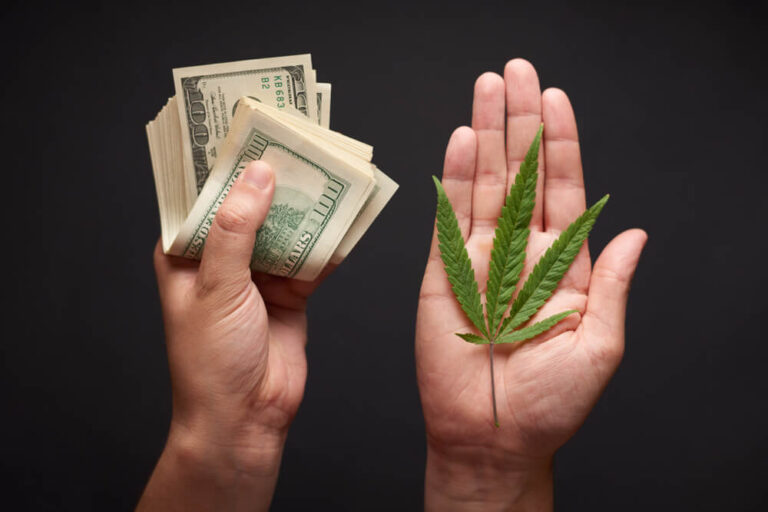
Study: High CBD Doses May Intensify THC Effects
- Cannabis News
- Cannabutter Digest
It may not be the rivalry of the century. It may not even rise to the level of the cola wars: Coke versus Pepsi. However, in some circles of the cannabis community, people have strong preferences for THC-dominant strains versus CBD-dominant strains. The two primary chemical compounds in marijuana have vastly different effects on the mind and body. That’s why many cannabis coinsurers seek marijuana strains that have higher concentrations of one chemical over the other.
Now, new research suggests that the relationship between CBD, the non-psychoactive cannabinoid in marijuana, and THC, the primary psychoactive compound in marijuana, are more closely related than previously thought.
THC vs. CBD
The two most widely recognized chemical compounds in marijuana are THC and CBD. Delta-9-tetrahydrocannabinol, or THC, is the primary psychoactive chemical in cannabis. It is responsible for giving people the “high” euphoric feelings marijuana is traditionally known for. In addition to making people feel high, some studies show that THC may also help relieve pain and reduce nausea, in addition to providing other potential therapeutic benefits. Sativia-dominant marijuana strains traditionally contain higher concentrations of THC.
CBD is THC’s more reserved cousin. It does not produce a “high” effect, but studies show it can help reduce anxiety, ease symptoms of insomnia, reduce pain, and treat seizures. Since CBD is a non-psychoactive compound, it has been a popular additive in drinks, edibles, and skin care products, even in states where recreational marijuana is still illegal. In states with legalized medical or recreational marijuana programs, Indica-dominant strains tend to have higher concentrations of CBD versus THC.
What’s the Difference?
Many cannabis enthusiasts select cannabis products based on the THC or CBD concentrations. If you want to chill out with friends at the end of a long day or fall into a peaceful night’s sleep, then a marijuana strain with higher levels of CBD is the product for you. Are you looking for a jolt or some enhanced mental clarity? Maybe you want to feel high? Then, a THC-heavy strain may be right for you. Combining THC and CBD in varying concentrations can also create different mind and body effects.
The point of this THC versus CBD showdown is to show that most people still think of cannabis in terms of one chemical compound doing this while the other does that. To feel one way, you need more THC, and to counterbalance those feelings, you need more CBD. They are chemical compounds on opposite ends of the spectrum. However, new research may challenge those beliefs and show that THC and CBD work together in ways people may have never thought about.
New Study Shows CBD May Enhance Psychoactive Effects
The significant draw of CBD is that it can provide therapeutic benefits without triggering a “marijuana high.” It is the main non-psychoactive chemical compound in cannabis plants. However, new research shows that CBD may increase the psychoactive effects of cannabis. The study is significant because marijuana enthusiasts often consume CBD to reduce the effects of taking too much THC. Instead of balancing out the high, people may be inadvertently intensifying the effects of marijuana.
A 2006 study, perhaps groundbreaking for the time, theorized that CBD blocks THC’s effects. Due to the way CBD interacts with endocannabinoid receptors in the brain, the compound could block the activity of THC, lessening the “high” produced by the psychoactive chemical. For years, it was thought that CBD balanced the effects of THC. Yet now, studies show that CBD may intensify the psychoactive effects of THC, not block them.
A study from Johns Hopkins Medicine shows similar results. Researchers found that CBD may increase specific adverse effects of THC when consumed in edible cannabis products. The study found that the maximum amount of THC in study participants’ blood samples was nearly twice as high after consuming a brownie edible with THC and CBD versus study participants who consumed an edible brownie with THC only. The results were astounding because the dose of THC in each brownie was the same for all participants, only 20 mg.
Those who consumed the brownie with CBD and THC also reported an increase in heart rate and other adverse effects. Overall, the study found that THC effects seem to be stronger and longer-lasting when combined with CBD, suggesting a significant metabolic interaction between the two cannabinoid compounds. CBD is not necessarily working against THC. Instead, they may work together in ways previous research could not identify.
What Does It Mean?
Authors of the most recent study on CBD and THC suggest that low doses of CBD may not significantly increase a person’s high, but it may be possible. CBD can trigger biphasic effects, meaning that it can have one effect at low doses and a different effect at higher doses. The interactions between CBD, THC, and other chemical compounds in cannabis plants are still not well understood.
Johns Hopkins researchers acknowledged that more studies are needed to understand the impact of THC and CBD in terms of relative concentrations, frequency of use, and individual health differences and outcomes. Understanding critical interactions between chemical compounds in marijuana can lead to significant innovations in the therapeutic and non-therapeutic uses of cannabis products. Understanding the complexity of this interaction also benefits cannabis consumers looking to maximize the therapeutic benefits of cannabis without jeopardizing their health and well-being.
In the meantime, cannabis enthusiasts should tread carefully when mixing high-dose THC products with high-dose CBD products. Some studies show combining CBD and THC can reduce issues like anxiety, paranoia, and pain relief, while others suggest there is little to no impact. There is not enough research to pinpoint the specific interactions between THC and CBD, not to mention the hundreds of other chemical compounds present in cannabis plants.
Read More Cannabutter Digest!
Learn more about all aspects of cannabis culture at Cannabuter Digest. Our comprehensive website has cannabis-related news, recipes, and product reviews.






